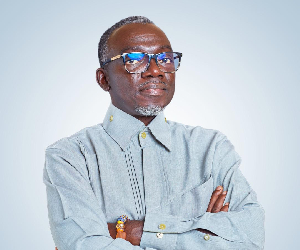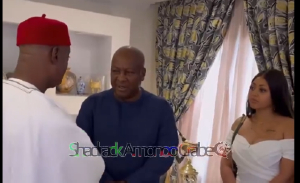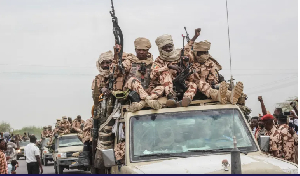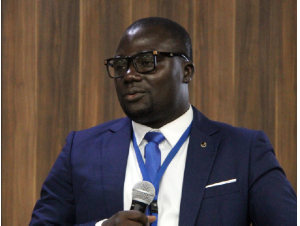Paying heed to our popular proverb; ?some one else does not drink medicine for the sick person?, Ghanaians in North America have started to organize themselves to lend their collective voice to the debates, lobbying and education processes necessary to ensure that Ghanaians abroad vote in Ghana?s elections beginning in 2008. There is no question that there is an overwhelming desire for the hundreds of thousands of Ghanaians abroad in the Diaspora to have a say in the choice of the country?s leadership that transcends monetary remittances. Though gratified by the consistent acknowledgement that the billions of dollars of annual remittances from Ghana?s Diaspora have risen to a level representing the third highest foreign exchange earner; behind cocoa and gold, the Ghana Diaspora welcome the current move in Parliament that will allow them to register in their countries of abode and vote in Ghana?s elections. This is seen as a long overdue show of the flip side of the coin.
It is painfully noted that Ghana has had no less than four general elections since the 1992 Constitution and all of them, be they won by the NDC or NPP, have disenfranchised Ghanaians abroad who could easily be larger in numbers than most regions in Ghana. This matter then must be treated with a sense of urgency and respect. If Ghana is serious about inclusion, pluralism and democratic governance then it cannot continue to treat this as a matter of convenience for those abroad as some people in Ghana would prefer to denigrate and trivialize a constitutional right. No, the growing hundreds of thousands of Ghanaians abroad who represent the largest investor group to the economy, no matter how others would like to describe billions of dollars of annual remittances, will not sit idly by. Ghana cannot seek to be the gateway to West Africa and simultaneously cede leadership in absentee ballot to Senegal and Mali. These two countries have had successful Diaspora voting exercises with Ghana?s Electoral Commission even assisting Malian residents in Ghana. Senegal and Mali?s democracies have been enhanced, the sky never fell and voting frauds have not been reported by anyone. What are we afraid of, Ghana? The moment is now. The formal process of organization began in early July with Town Hall Meetings in Houston and New York by Ghanaians who welcomed the Deputy Chairman in charge of Operations of the Ghana Electoral Commission, Mr. Kwadwo Sarfo-Kantanka, to lend his expertise to the discussions. The meetings were non-partisan and focused on some of the items that needed clarification. The Deputy Chairman discussed the pending ?Representation of the People (Amendment) Act, 2005 (ROPAA) and why it is necessary to correct the omission of the general population of Ghanaians abroad from the prevailing instrument of electioneering in Ghana, PNDC Law 284 , 1992.THE ISSUE
Most people in the audience were shocked to learn that even though the Constitution of the Republic of Ghana, 1992 in Chapter 7 article 42, states that:?every citizen of Ghana of eighteen years of age or above and of sound mind has the right to vote and is entitled to be registered as a voter for the purposes of public elections and referenda?,
Section 8 of the Representation of the People Law, 1992 (PNDCL 284) only gives a very limited number of Ghanaians who are not resident in Ghana the right to register and vote. If you are not employed outside Ghana in the service of the Republic or in the service of the UN or other international organizations on behalf of the Government then the only way you can exercise the Right enshrined in the Constitution as a Ghanaian is to board a plane and head to your polling division, stay there for six months and then register to vote. The audience learned that, for the rest of us teeming masses, it is this six-month polling place in Ghana requirement that the ROPAA of 2005 seeks to correct without compromising the constitutional right of all Ghanaians to vote. As submitted by the Attorney General, ROPAA is a very brief Bill that states: ?An ACT to amend the Representation of the People Law, 1992 (PNDCL 284) to enable Ghanaians resident abroad to register to vote in elections. ENACTED by the President and the Parliament: PNDCL 284 amended
The Representation of the People law, 1992 (PNDCL 284) as amended is further amended as follows: (a) by the substitution for section 8 of the following: ?Registration of Ghanaian citizens abroad
8. (1) A person who is a citizen of Ghana resident outside the Republic is entitled to be registered as a voter if the person satisfies the requirements for registration prescribed by law other than those relating to residence in a polling division.
(2) The Commission may appoint the Head of a Ghana Mission or Embassy abroad or any other person or institution designated in writing by the Commission as a registration officer to register a person to be a voter for an election.
(3) The Commission may give such directions as it considers appropriate to a person appointed as a registration officer?
(b) by the insertion of the following after ?by-election? in section 50. ?citizen? means a citizen of Ghana under the Constitution Act, 2000.
Commencement of this Act 2. This Act shall come into force on a date determined by the Commission in an Executive Instrument under the hand of the Chairman of the Commission.?
THE REACTIONS
Ghanaians in the Town Hall meetings in Houston (July 9, 2005) and New York (July 10, 2005) were appreciative of the time Mr. Sarfo-Kantanka took from his personal trip to the US to accede to the requests of Jermaine Nkrumah (Houston) and Kofi A. Boateng (New York), the moderators, to participate in these crucial meetings. The lessons the groups learned were important and galvanized them into decisions to play a more active role in the debates to ensure that unlike 2004, this ROPAA 2005 does not slip away. They promised to form a standing DIASPORA VOTE COMMITTEE (DVC) to serve as the formal channel to direct the views of the Diaspora. Even though the DVC will naturally start in the US, it is the intention that eventually, it will encompass Ghanaians in the worldwide Diaspora. A follow-up meeting via a conference call on July 16, 2005 gave birth to the DVC and representatives from Canada enthusiastically joined. Two Sub Committees were formed: LEGAL, headed by Dr, Agyenim Boateng an Assistant Attorney General of Kentucky and PUBLIC RELATIONS headed by Jermaine Nkrumah of Houston. The Committees and others that may be necessitated in the future, will research and provide cogent positions on issues such as; definition of the Ghanaian citizen; the instruments of identification for purposes of voter registration; the issue of dual citizenship; the rights of the children of the Diaspora who come of age; the role of the Electoral Commissioner; the role of the Ghana Mission/Embassies or other appointed agents of the Electoral Commissioner; funding the absentee voting ; participation in all elections by all qualified Diaspora versus selective or pilot voting ; ballot fairness and security; and lessons from other developing countries who have implemented successful absentee ballot initiatives. The Ghana Diaspora sends a clear message of support to the Parliament to pass ROPAA, 2005 and some interesting outcomes ensued from a basic polling at the at the Town Hall meetings. One hundred percent of the respondents stated that if they could vote in Ghana?s elections, it would make them pay more attention to Ghana?s issues and invest more in the country. Ninety-eight percent will pay $20- $50 in fees to offset the cost of the exercise. Over ninety percent will prefer to vote in both Ghana?s Parliamentary and Presidential elections. Upon further discussion, the attendees agreed that they would be willing to start with the Presidential election first and let the system mature without yielding their right to vote in future parliamentary or district elections.It is very unfortunate that misinformation, fear-mongering and baseless resistance are creeping into a process that should happen in civility and almost without fanfare except one of expression of national pride. The entire legislature of Mexico rose and sang their national anthem when they passed a bill that extended the voting right to their millions of residents abroad. The singing was a mark of victory for Mexico?s democracy and reach to its citizens everywhere. We look forward to such a victorious moment in Ghana. Are there problems on the way? Can we solve them? The answer is a confident yes to both because at the minimum, we can learn from others and need not reinvent any wheel. As they say, the battle is joined and the ?sick person has picked up the medicine bottle?. You will hear more from The DIASPORA VOTE COMMITTEE in print, radio and TV. Ghana?s Parliament will hear about DVC as the general population both in Ghana and abroad. We owe this not only to ourselves but also to the deepening of the meaning of and passion for Ghana for future generations regardless of place of abode. After all it is a global village and Ghana seeks to be the village chief in a part of that shrinking world, doesn?t it? Then let us all do the right thing, engage in self-respecting debates, seek common solutions and echo our own home-grown refrain of old:
?FORWARD EVER, BACKWARD NEVER!?

















